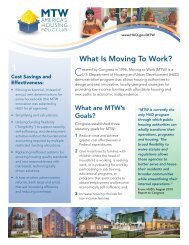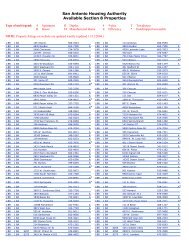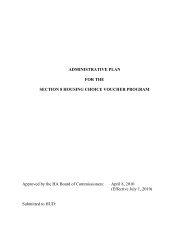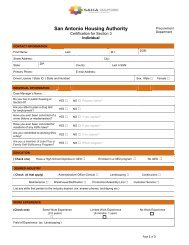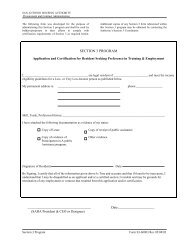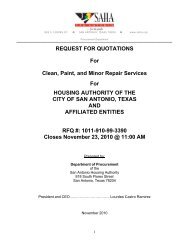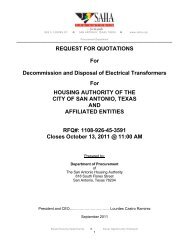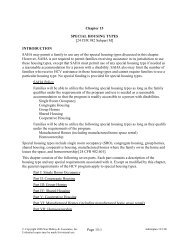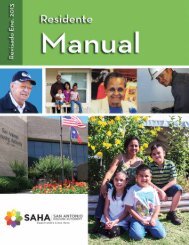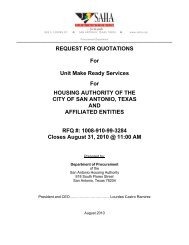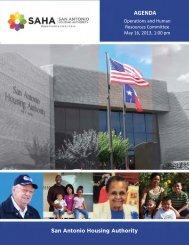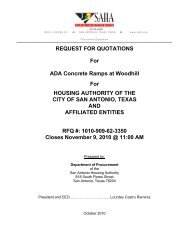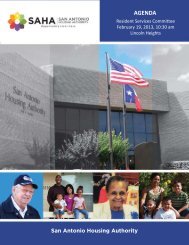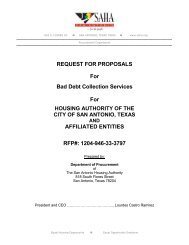Create successful ePaper yourself
Turn your PDF publications into a flip-book with our unique Google optimized e-Paper software.
XII. Definitions of Terms Used in This Statement of Policies<br />
1. Absent Head, Spouse, or Co-head – An employed head, spouse, or co-head absent from the unit more than<br />
90 consecutive days due to employment will continue to be considered a family member.<br />
2. Accessible dwelling units -- When used with respect to the design, construction or alteration of an individual<br />
dwelling unit, means that the unit is located on an accessible route and when designed, constructed, altered,<br />
or adapted can be approached, entered, and used by individuals with physical disability. A unit that is on an<br />
accessible route and is adaptable and otherwise in compliance with the standards set forth in [24 CFR § 8.32 &<br />
§ 40] [the Uniform Federal Accessibility Standards] is “accessible” within the meaning of this paragraph.<br />
When an individual dwelling unit in an existing facility is being modified for use by a specific individual, the<br />
unit will not be deemed accessible, even though it meets the standards that address the impairment of that<br />
individual, unless it also meets the UFAS standards.<br />
3. Accessible Facility – All or any portion of a facility other than an individual dwelling unit used by individuals<br />
with physical disability. [24 CFR § 8.21]<br />
4. Accessible Route – For persons with mobility impairment, a continuous unobstructed path that complies with<br />
the space and reach requirements of the Uniform Federal Accessibility Standards. For persons with hearing<br />
or vision impairments, the route need not comply with requirements specific to mobility. [24 CFR § 8.3 & §<br />
40.3.5]<br />
5. Adaptability – Ability to change certain elements in a dwelling unit to accommodate the needs of disability and<br />
non-disability persons; or ability to meet the needs of persons with different types & degrees of disability. [24<br />
CFR § 8.3 & § 40.3.5]<br />
6. Admission – to the program is the effective date of the Lease. The point at which the family becomes a resident<br />
7. Adult – A Person who is 18 years of age of older, or who has been convicted of a crime as an adult under any<br />
Federal, State or tribal law.<br />
8. Alteration – Any change in a facility or its permanent fixtures or equipment. It does not include: normal<br />
maintenance or repairs, reroofing, interior decoration or changes to mechanical systems. [24 CFR § 8.3 & § 8.23<br />
(b)]<br />
9. Applicant – A person or a family that has applied for admission to housing.<br />
10. Application – A written form, to be signed and dated by an adult member of the family, which includes<br />
information the <strong>Authority</strong>, needs to determine whether the family may be admitted in accordance with Section<br />
V of this Policy.<br />
11. Area of Operation – The jurisdiction of SAHA as described in applicable State law and the SAHA’s Articles of<br />
Incorporation.<br />
12. Assets – Assets means “cash (including checking accounts), stocks, bonds, savings, equity in real property, or<br />
the cash value of life insurance policies. Assets do not include the value of personal property such as<br />
furniture, automobiles and household effects or the value of business assets.” IMPORTANT: See the<br />
definition of Net Family Assets, for assets used to compute annual income. (See 24 CFR § 5.603 for definition of<br />
Net Family Assets)<br />
13. Assistance animals – Needed as a reasonable accommodation for persons with disabilities are not considered<br />
pets, and thus, is not subject to PHA pet policies.<br />
a. Assistance animals are animals that work, provide assistance, or perform tasks for the benefit of a<br />
person with a disability, or animals that provides emotional support that alleviates one or more<br />
identified symptoms or effects of a person's disability. Assistance animals – often referred to as<br />
“service animals,” “assistive animals,” “support animals,” or “therapy animals” – perform many<br />
SAHA <strong>ACOP</strong> Page 3 of 60 1/2012



